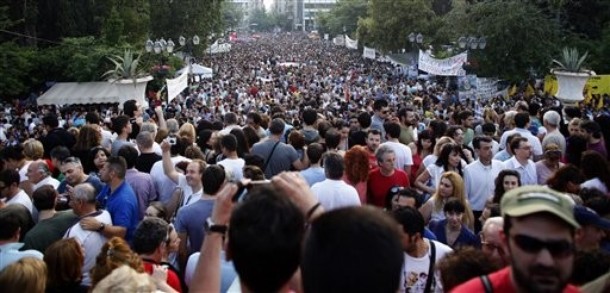
In the face of severe public sector cuts the Greek people have taken to the streets of Athens and other major cities. On 6 June between 300,000 to 500,000 people demonstrated on the capital’s streets to the chorus of ‘Can’t pay! Wont pay!’ and on 15 June Greece had its tenth general strike in two years, bringing much of the country to a standstill. Many protestors congregated outside the Parliament building where the Pan Hellenic Socialist Movement (PASOK) government, led by Prime Minister George Papandreou, sought to push through further austerity measures. The government is on its knees, with party resignations leaving PASOK a parliamentary majority of only four. On 17 June, Papandreou reshuffled his cabinet and appointed a new finance minister, Evangelos Venizelos. This new cabinet includes so-called ‘anti-cuts’ members of PASOK and is expected to survive a confidence vote on 21 June. After this vote it will approve a package which envisages €28bn in tax hikes and spending cuts by 2015.
Further bailout required
Eurozone finance ministers have postponed their decision on a €12bn ($17bn; £10bn) loan to Greece until it introduces further austerity measures. The ministers said they expected to pay the latest tranche of the May €110bn EU and IMF aid package by mid-July. The EU and IMF want to wait until after the confidence vote and the passing of further austerity measures on 21 July before releasing the funds. The ministers also committed to put together a second bailout package to keep the country afloat. Such a package is likely to be similar in size to the first one and was agreed only after Germany backed down from its insistence that private investors taking a greater role in buying up Greek debt, a stance opposed by the European Central Bank. Now, according to the Financial Times, Germany is ‘throwing its weight behind a voluntary rollover of Greek debt rather than a full-scale debt exchange with extended maturities.’ The deal should be enough to stop Greece from defaulting on debt payments over July and August. This is how the crisis-ridden Greek economy is surviving – on a month to month basis.
European Union fears contagion
The fact that Greece is very close to defaulting on its debt has sent shock waves through the world stock markets, particularly for the Germans and the French. Germany fears that if Greece defaults there will be a greater impetus for the Portuguese and Irish economies to default as well. In the worst case scenario, Spain would also request a fiscal stimulus to deal with its own debt problem and possibly Italy too. Such an eventuality could bring about the death of the euro along with the German/French aspiration of a centralised European economic state. On the international markets, Greece is being compared to Lehman Brothers in 2008 – a potential catalyst for another global recession.
Beyond the fear of economic contagion there is another pressing reason for the main EU powers to prevent Greece defaulting on their debt. Quite simply the debt is owed to them. France is currently exposed to the tune of €52bn regarding investments in Greece, Germany an estimated €30bn and the UK €14bn. Given this reality it is difficult to see how Greece will ever be allowed to default. Following the recent degrading of Greece’s credit rating by credit raters Moodys to CCC – the lowest rating possible – Moodys went on to imply that France’s three biggest banks may in turn need their rating readjusted due to their huge investments in Greece!
A new movement takes hold
The Greek people are seeing the debt build up like a mountain before them and they refuse to accept it. What is happening now in Greece is more than just a few protests – it is a mass movement. Over the past week hundreds of thousands of the protestors calling themselves the ‘indignants’ have camped out in Athens’s Sygmata Square to debate and find solutions to the country’s problems. Inspired by Tahir Square in Cairo and recent protests in Madrid, this gathering and others like it around the country have been organised independently of the old opportunistic left and trade union bureaucracy and have been attended by a large number of Greece’s disillusioned working class. Many Greek people have found themselves engaging in political activity for the first time. Protester Vangelis Papadoyiannis, a 46-year-old IT worker said ‘They want to suppress social rights acquired in past decades and take us back to the Middle Ages to save banks and bankers. In my company there were 100 lay-offs in January alone; our salaries were cut by 15% and there is more to come.’ Litsa Papadaki, 60, a housewife also protesting in Athens said: ‘Enough is enough! They are killing us and our children.’
As with the developments of all movements all sorts of political trends are emerging. This is evident in the Syntagma Square occupation where the anarchist and radical left hold the square itself, with control of the popular assembly and the permanent encampment. There are however components of the right, from populist to nationalist and racist trends which are attempting to hijack the movement. Fights are taking place, not just between protesters and the police but between anarchists and these reactionary trends.
The trade unions and the established left are marginalised for the present. They have demonstrated themselves as being bankrupt both in their policies and actions and hold little sway with the majority of people. They have failed to mobilise when it has mattered and have refused to make a clear break with PASOK. These old opportunistic organisations are now being left behind by the movement. There is a fresh optimism now as the Greek people are organising between themselves, debating problems and discussing possible solutions. This is the precondition for the development of a new and principled leadership, one which can root the movement in the neighbourhoods, workplaces and universities.
Victory to the Greek People!




